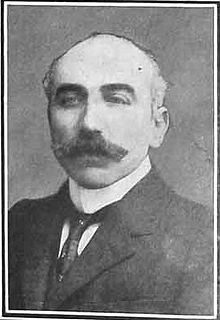Wednesbury was a borough constituency in England's Black Country which returned one Member of Parliament to the House of Commons of the Parliament of the United Kingdom from 1868 until it was abolished for the February 1974 general election.
Thomas Bridgehill Wilson Ramsay was a Scottish Liberal Party, and National Liberal Party politician and Member of Parliament (MP).
The Horncastle by-election of 1920 was a parliamentary by-election held for the British House of Commons constituency of Horncastle in Lincolnshire on 25 February 1920. The seat had become vacant when the sitting Coalition Unionist Member of Parliament, William Weigall, who had held the seat since 1911, resigned upon being appointed Governor of South Australia.
The Aberdeenshire and Kincardineshire Central by-election was a parliamentary by-election held for the British House of Commons constituency of Aberdeenshire and Kincardineshire Central on 16 April 1919.
The Middleton and Prestwich by-election, 1920 was a by-election held on 22 November 1920 for the British House of Commons constituency of Middleton and Prestwich in Lancashire.

Sir William Ryland Dent Adkins was an English barrister, judge and Liberal politician.

The Bodmin by-election, 1922 was a parliamentary by-election for the British House of Commons. The constituency of Bodmin in Cornwall polled on 24 February 1922. The by-election was notable for the opposition Liberal Party gaining a seat from the Coalition supporting Conservative Party.
The Argyllshire by-election, 1920 was a parliamentary by-election held for the British House of Commons constituency of Argyllshire on 10 March 1920.

Edward Anthony Strauss was an English corn, grain and hop merchant of German-Jewish background. He was a Liberal, later Liberal National Member of Parliament.
The Pontefract by-election, 1919 was a parliamentary by-election held for the British House of Commons constituency of Pontefract in Yorkshire on 6 September 1919.

James Arthur Dawes was an English solicitor, businessman and Liberal Member of Parliament (MP) from 1910 to 1921.
The Penrith and Cockermouth by-election, 1921 was a parliamentary by-election held for the British House of Commons constituency of Penrith and Cockermouth in Cumberland on 13 May 1921.

Sir William Pearce was an English chemical manufacturer and Liberal Party politician in the East End of London, in England. He was Member of Parliament (MP) for Limehouse constituency from 1906 to 1922. He played cricket as an amateur for Kent County Cricket Club and Essex County Cricket Club in his 20s, making three first-class appearances, all of them for Kent.
The Orkney and Shetland by-election, 1921 was a parliamentary by-election held for the British House of Commons constituency of Orkney and Shetland on 17 May 1921.
The East Dorset by-election, 1921 was a parliamentary by-election held for the House of Commons constituency of East Dorset on 16 April 1921.
The Northampton by-election was a parliamentary by-election held for the British House of Commons constituency of Northampton on 1 April, 1920.

Maurice Alexander, was a Canadian barrister and soldier who later moved to England and had careers in the Diplomatic Service, English law and politics.
The Govan by-election, 1910 was a parliamentary by-election held for the House of Commons constituency of the Govan Division of Lanarkshire on 28 April 1910.
Sir Henry Norman Rae was an English wool merchant and Liberal Party politician.
The Keighley by-election, 1918 was a parliamentary by-election held for the House of Commons constituency of Keighley in the West Riding of Yorkshire on 26 April 1918.
















